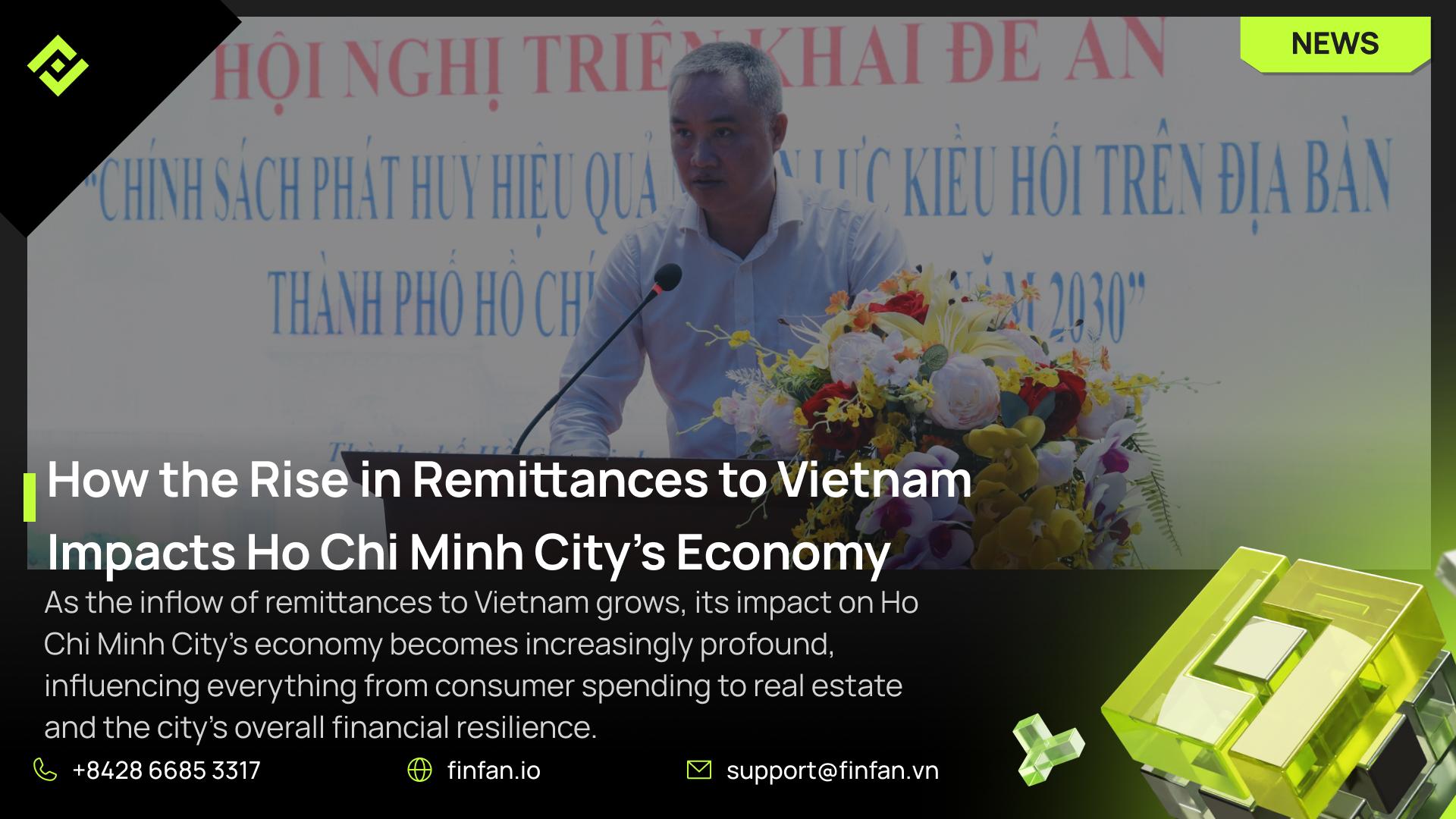How the Rise in Remittances to Vietnam Impacts Ho Chi Minh City's Economy

In recent years, the volume of remittances to Vietnam has surged, bolstered by the strong connections of Vietnamese expatriates who continue to send money home to support their families and invest in various sectors.
In a previous article related to remittances to Vietnam, FinFan mentioned that Vietnam's increasingly developing economy is a factor that attracts international investors and drives the growth of fintech especially remittances to the country.
On the other hand, meanwhile, Ho Chi Minh City, Vietnam's bustling economic hub, has long been a significant recipient of remittances from overseas.
As the inflow of remittances grows, its impact on Ho Chi Minh City’s economy becomes increasingly profound, influencing everything from consumer spending to real estate and the city’s overall financial resilience.
1. Boosting Consumer Spending and Economic Growth
Remittances fuel the local economy by boosting household income, which in turn drives consumer spending.
Many families in Ho Chi Minh City depend on these funds to cover essential expenses, education, healthcare, and lifestyle enhancements.
As disposable income rises, local businesses experience increased demand for goods and services, contributing to overall economic growth.
This increased consumer spending ripples through various sectors, creating a multiplier effect that enhances economic activity across the city.
“Notably, in the last months of the year, particularly in the fourth quarter, remittances from various countries to Vietnam in general, and to Ho Chi Minh City in particular, always reach their peak, sometimes contributing over 30% of the total annual remittance volume”
According to Mr. Nguyen Duc Lenh, Deputy Director of the State Bank of Vietnam’s Ho Chi Minh City branch, during the conference on October 11, 2024, which discussed leveraging remittance resources.
2. Stimulating the Real Estate Market
One of the notable impacts of remittances is the stimulation of the real estate market in Ho Chi Minh City.
A substantial portion of these funds is directed toward purchasing property or land. As a result, demand for residential and commercial real estate has increased, driving up property prices in certain areas of the city.
This trend not only attracts local investors but also encourages foreign direct investment, further integrating Ho Chi Minh City into the global economy.
However, the rising property values can also pose challenges for affordability and may create disparities within the real estate market.
Furthermore, the sharp increase in property prices may cause businesses to shift their focus away from producing goods or developing specialized services, instead moving towards real estate speculation.
This shift can lead to significant losses for businesses, trapping them in a cycle of debt and gradually pushing them toward bankruptcy or litigation due to insufficient cash flow to cover the interest on loans previously raised for real estate investments.
Some notable cases, including those involving Shark Nguyen Ngoc Thuy and representatives from Tan Hiep Phat, have emerged, where there have been attempts to seize others' assets, specifically real estate.
The most high-profile and widely discussed case is that of Ms. Truong My Lan, involving large and highly valuable real estate projects in Ho Chi Minh City, and even across Vietnam.
Read more:
. The Real Estate Market in Vietnam Is Booming Thanks to Remittances.
3. Enhancing Financial Stability
Remittances serve as a stable and reliable source of foreign currency, which supports Vietnam’s balance of payments and enhances financial stability.
Ho Chi Minh City, being the financial center of Vietnam, benefits from this inflow as it strengthens the city’s banking sector.
Banks are able to extend more credit, offer better financial products, and attract foreign investors.
Furthermore, increased deposits from remittances help banks meet capital adequacy requirements, which is crucial for maintaining financial resilience.
*Also according to Mr. Nguyen Duc Lenh, Deputy Director of the State Bank of Vietnam's Ho Chi Minh City branch, during the conference on leveraging remittance resources on October 11, 2024:
"Among the opinions shared at the conference, a notable point was how to attract remittances for purchasing municipal bonds in Ho Chi Minh City by enhancing transparency in information regarding issuance and organizing the issuance process. Only then can we invite these resources to contribute to the bond issuance."
Mr. Nguyen Duc Lenh further stated that foreign investment or loan capital must adhere to the principle of repayment, not to mention the borrowing conditions and repayment pressures along with other related factors.
Meanwhile, remittance resources are not subject to these impacts and requirements. Therefore, effectively utilizing remittances can bring tremendous benefits across various aspects, from individual households to social and economic development.*
*Source: Danviet.vn
4. Supporting Small and Medium-Sized Enterprises (SMEs)
A significant portion of remittances goes into entrepreneurial activities, helping establish or expand small and medium-sized enterprises in Ho Chi Minh City.
Many recipients invest in local businesses, whether it be a family-owned retail shop, a café, or a tech startup.
This investment not only fosters job creation but also drives innovation within the city. The growth of SMEs also contributes to increased tax revenue for the local government, enabling further public investments in infrastructure and services.
Another group similar to small and medium-sized enterprises is individuals who are currently working for international companies under affiliate contracts or project-based arrangements, as the labor costs abroad are higher than those in Vietnam.
This group includes:
- KOLs/KOCs who promote and receive commissions for international products,
- outsourcing management for international digital marketing projects,
- outsourcing management for international IT projects, among others,
- …
Read more:
. The Intersection of Social Earning and Cross-Border Payments in Vietnam
5. Contributing to Economic Inequality and Urban Challenges
While remittances have a generally positive impact, they can also contribute to economic inequality in Ho Chi Minh City.
As families who receive remittances accumulate wealth, they often have more opportunities than those who do not have access to such funds.
This disparity can lead to urban challenges, including increased pressure on public services and a widening income gap between different socioeconomic groups.
This article was curated and authored by FinFan's market research and development team, alongside our marketing department.
About FinFan
FinFan is a cross-border embedded financial services company that focuses on mass disbursement, fund collection, card processing, IBAN, and digital APMs solutions, which can provide valuable input and integration on and for the same.
FinFan is already integrated with almost the world's well-known MTOs, PSPs, switch, and core fintech platforms such as Money Gram, Thunes, Qiwi, Remitly, World Remit, Bancore, PaySend, Terrapay, Ria Money Transfer (Euronet), Dlocal, Ripple, TripleA, FoMo Pay, Wings, etc.
For more information, please get in touch with us through:
🌐https://finfan.io
📞(+84) 2866 85 3317
✉ support@finfan.vn
LinkedIn: [FinFan](https://www.linkedin.com/company/finfanio" \t "%5Fblank)





